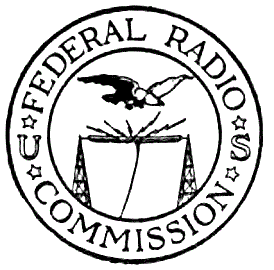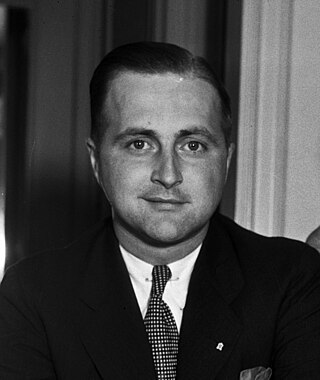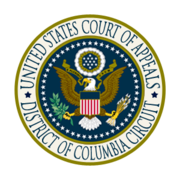
The Federal Radio Commission (FRC) was a government agency that regulated United States radio communication from its creation in 1927 until 1934, when it was succeeded by the Federal Communications Commission (FCC). The FRC was established by the Radio Act of 1927, which replaced the Radio Act of 1912 after the earlier law was found to lack sufficient oversight provisions, especially for regulating broadcasting stations. In addition to increased regulatory powers, the FRC introduced the standard that, in order to receive a license, a radio station had to be shown to be "in the public interest, convenience, or necessity".

The Communications Act of 1934 is a United States federal law signed by President Franklin D. Roosevelt on June 19, 1934, and codified as Chapter 5 of Title 47 of the United States Code, 47 U.S.C. § 151 et seq. The act replaced the Federal Radio Commission with the Federal Communications Commission (FCC). It also transferred regulation of interstate telephone services from the Interstate Commerce Commission to the FCC.
Federal Communications Commission v. Pacifica Foundation, 438 U.S. 726 (1978), was a landmark decision of the United States Supreme Court that upheld the ability of the Federal Communications Commission (FCC) to regulate indecent content sent over the broadcast airwaves.
The fairness doctrine of the United States Federal Communications Commission (FCC), introduced in 1949, was a policy that required the holders of broadcast licenses both to present controversial issues of public importance and to do so in a manner that fairly reflected differing viewpoints. In 1987, the FCC abolished the fairness doctrine, prompting some to urge its reintroduction through either Commission policy or congressional legislation. The FCC removed the rule that implemented the policy from the Federal Register in August 2011.

George Edward Cryer was an American lawyer and politician. A Republican, Cryer served as the 32nd Mayor of Los Angeles from 1921 to 1929, a period of rapid growth in the city's population. During his administration, the Los Angeles City Hall and Los Angeles Memorial Coliseum were built, and the city's population surpassed 1,000,000. Prior and subsequent to serving as mayor, he was a lawyer. Between 1929 and 1931, Cryer became engaged in a widely publicized libel court case with the Reverend Robert P. Shuler, a radio evangelist who accused Cryer of being a "grafter" who had entered office a poor man and left office a millionaire.
The Radio Act of 1927 was signed into law on February 23, 1927. It replaced the Radio Act of 1912, increasing the federal government's regulatory powers over radio communication, with oversight vested in a newly created body, the Federal Radio Commission. It also was the first legislation to mandate that stations had to show they were "in the public interest, convenience, or necessity" in order to receive a license. The Act was later replaced by the Communications Act of 1934.

Prometheus Radio Project v. FCC is the general title of a series of cases heard by the U.S. Court of Appeals for the Third Circuit from 2003 to 2019. A media activist group, Prometheus Radio Project, challenged new media ownership rules put forth by the Federal Communications Commission (FCC) in 2002. In the first court challenge in 2004, the Third Circuit overruled an attempt by the FCC to raise the limits of media ownership within markets and relax cross-ownership prohibitions, and determined that a diversity index used by the FCC had been formulated inconsistently.
Red Lion Broadcasting Co. v. Federal Communications Commission, 395 U.S. 367 (1969), was a seminal First Amendment ruling at the United States Supreme Court. The Supreme Court held that radio broadcasters enjoyed free speech rights under the First Amendment, but those rights could be partially restricted by the Federal Communications Commission (FCC) to maintain the public interest in equitable use of scarce broadcasting frequencies. As a result, the FCC's Fairness Doctrine was found to be constitutional.
Turner Broadcasting System, Inc. v. FCC is the general title of two rulings of the United States Supreme Court on the constitutionality of must-carry regulations enforced by the Federal Communications Commission on cable television operators. In the first ruling, known colloquially as Turner I, 512 U.S. 622 (1994), the Supreme Court held that cable television companies were First Amendment speakers who enjoyed free speech rights when determining what channels and content to carry on their networks, but demurred on whether the must-carry rules at issue were restrictions of those rights. After a remand to a lower court for fact-finding on the economic effects of the then-recent Cable Television Consumer Protection and Competition Act, the dispute returned to the Supreme Court. In Turner II, 520 U.S. 180 (1997), the Supreme Court held that must-carry rules for cable television companies were not restrictions of their free speech rights because the U.S. government had a compelling interest in enabling the distribution of media content from multiple sources and in preserving local television.

WLAP is a commercial AM radio station in Lexington, Kentucky, serving the Central Kentucky region. It airs a news/talk format and is owned by iHeartMedia, Inc. The studios and offices are on Nicolasville Road in Lexington.

Robert Pierce Shuler Sr., also known as "Fighting Bob", was an American evangelist and political figure. His radio broadcasts from his Southern Methodist church in Los Angeles, California, during the 1920s and early 1930s attracted a large audience and also drew controversy with his attacks on politicians and police officials. In 1931, the Federal Radio Commission revoked Shuler's broadcast license due to his outspoken views. He ran for the United States Senate in 1932 on the Prohibition Party ticket and attracted more than 500,000 votes.

Lutheran Church–Missouri Synod v. FCC was a 1998 D.C. Circuit Court of Appeals case involving the Federal Communications Commission's (FCC) enforcement of the Equal Employment Opportunity Act and the Fifth Amendment. The FCC claimed that the Lutheran Church–Missouri Synod (LCMS) had violated the FCC's Equal Employment Opportunity requirements by not hiring enough minorities/women and by requiring a knowledge of Lutheran doctrine in order to be hired to work at its two FM and AM radio stations located in Clayton, Missouri.

Harold Arundel Lafount was an American businessman who served on the Federal Radio Commission from 1927 to 1934. He was the father of Lenore Romney; the father-in-law of businessman and politician George W. Romney; and the maternal grandfather of businessman and politician Mitt Romney.
The Davis Amendment was a provision attached to the March 28, 1928 reauthorization of the Radio Act of 1927, which mandated an "equality of radio broadcasting service" within the United States. It specified an "equitable allocation" among five regional zones, in addition to assignments proportional to population among the states within each zone. Its implementation resulted in the development of a complicated quota system by the Federal Radio Commission, and although its provisions were carried over to the Federal Communications Commission by the Communications Act of 1934, it ultimately proved impractical, and was repealed on June 5, 1936.
CBS, Inc. v. FCC, 453 U.S. 367 (1981), is a United States Supreme Court decision finding that the Federal Communications Act of 1934 created a new, individual right to broadcast access for candidates for federal office. Under this decision broadcast media were found to have an obligation to allow any legally qualified federal candidate running for public office to purchase network time under section 312(a)(7) of the 1976 amendment to the Communications Act.
WCHI was a radio station in Chicago, Illinois, United States, that operated from January 1, 1925, until it was deleted in 1932. The station—owned by the Peoples Pulpit Association, a corporation of the Jehovah's Witnesses—was established as WORD in Batavia before moving to Chicago in 1930 and changing its call letters. At the time of its deletion, it was transmitting with 5,000 watts on 1490 kHz. Its license was revoked by the Federal Radio Commission (FRC) over its attacks on the medical profession and in order to allow another station full-time use of the 1490 kHz frequency.
The Federal Radio Commission's (FRC) General Order 32, dated May 25, 1928, notified 164 of the over 600 existing U.S. radio stations that their applications for continued operation would be denied unless they showed that they met the FRC's "public interest, convenience, or necessity" standard. The result was the elimination of more than 60 stations, plus numerous power reductions, that somewhat reduced the congestion of the broadcast band, in preparation for implementation of the General Order 40 reallocation later that year.
WMBB-WOK was a high-powered radio station located in Homewood, Illinois, United States, a suburb of Chicago. It was deleted by the Federal Radio Commission (FRC) on September 1, 1928, as part of its implementation of General Order 32, which was used to reduce of the number of U.S. radio stations.

Charles Lewis "C. L." Carrell was a Chicago-based theater and talent promoter. Beginning in 1925, Carrell became the licensee for seven portable radio stations, which were sent to small towns in the midwest for limited runs, normally of a few weeks, to provide entertainment to localities that did not have their own stations.
Federal Communications Commission v. Sanders Brothers Radio Station, 309 U.S. 470 (1940), was an early precedent on the enforcement of broadcasting law in the United States. The Supreme Court held that when the Federal Communications Commission (FCC) makes spectrum allocation decisions regarding the use of broadcast frequencies by radio stations, such decisions should be made to serve the public interest, convenience, and necessity as defined by the Communications Act of 1934. Consequently, such decisions by the FCC do not need to consider the profitability or business interests of the companies assigned such frequencies, or those of their competitors.









